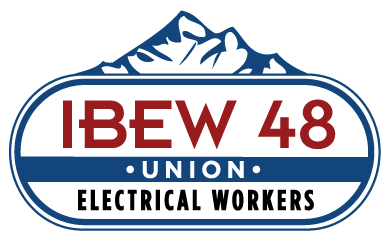Massive Infrastructure and Jobs Bill Becomes Law - What's Next?
Jan 05, 2022 - by: outlier-admin

The image above shows the current EV charging stations in Portland, Oregon which will grow considerably as the nation is about to invest $7.5 billion to develop a national network of 500,000 EV charging stations ($52 million for EV charging stations in Oregon). This is great news for the IBEW membership. Additionally this article from the Statesman journal outlines some of the Oregon specific investments totalling approximately $5.3 billion in federal funding for roads and other infrastructure.
Below is a summary of the "Massive infrastructure and jobs bill becomes law" article published by NW Labor Press back in November.
It’s the biggest investment in America’s physical infrastructure since the 1950s: Signed into law by President Joe Biden Nov. 16, the Infrastructure Investment and Jobs Act authorizes $1.2 trillion in federal spending over the next five years to upgrade bridges and highways, rail systems and transit, ports and airports, water systems, broadband infrastructure, and more. The $1.2 trillion figure combines $550 billion of new investment plus already expected spending from dedicated revenues like the federal gas tax.
For Oregon Congressman Peter DeFazio (D-Eugene), it’s a career-high moment. DeFazio is chair of the House Committee on Transportation and Infrastructure, and played a big role in crafting the law. At a Nov. 12 press conference and later by phone with the Labor Press, DeFazio was candid about his frustration that it wasn’t bigger still, but also celebrated the bill’s passage as a hugely important win.
 Oregon U.S. Rep. Peter DeFazio has been fighting for an infrastructure bill like this for decades.
Oregon U.S. Rep. Peter DeFazio has been fighting for an infrastructure bill like this for decades.
“I gotta say, to the unions: Warm up your apprenticeship programs. Get a bigger space and start looking to expand,” DeFazio said. “In terms of infrastructure, union jobs, Davis-Bacon, these are going to be family wage, high-benefit jobs, career jobs.…This is the largest investment that America’s ever made in its deteriorated infrastructure.”
 Coming soon: 500,000 electric charging stations, many of which will be installed by union members. “IBEW members will lead the way in building out the charging infrastructure needed for the wide-scale adoption of electric vehicles, buses, trains, and trucks,” said IBEW president Lonnie Stephenson in response to passage of the Infrastructure bill.
Coming soon: 500,000 electric charging stations, many of which will be installed by union members. “IBEW members will lead the way in building out the charging infrastructure needed for the wide-scale adoption of electric vehicles, buses, trains, and trucks,” said IBEW president Lonnie Stephenson in response to passage of the Infrastructure bill.
Highlights of the Infrastructure Act
- ROADS AND BRIDGES On top of reauthorizing surface transportation programs for five years, an additional $110 billion to repair roads and bridges, $11 billion for transportation safety programs, including projects to reduce traffic fatalities, and $1 billion to reconnect communities (disproportionately Black neighborhoods) that were divided by highways.
- PASSENGER RAIL $66 billion in additional rail funding to eliminate the Amtrak maintenance backlog, modernize the Northeast Corridor, and bring rail service to areas outside the northeast and mid-Atlantic.
- ELECTRIC TRANSMISSION LINES $65 billion to construct thousands of miles of new transmission lines to facilitate the expansion of renewables and clean energy.
- BROADBAND INTERNET $65 billion toward broadband infrastructure.
- DRINKING WATER $55 billion to improve water infrastructure and eliminate lead service pipes.
- EXTREME WEATHER RESILIENCY $50 billion to develop infrastructure to protect against droughts, heat, floods and wildfires.
- PUBLIC TRANSIT $39 billion of new investment to modernize transit, on top of $50 billion from existing transit programs for the next five years, will be the largest investment in public transit in U.S. history, paying for 24,000 buses, 5,000 rail cars, 200 stations, and thousands of miles of track, signals, and power systems in need of replacement.
- CLEANUP OF TOXIC SITES $21 billion to clean up Superfund and brownfield sites, reclaim abandoned mine land and cap orphaned oil and gas wells.
- PORTS AND AIRPORTS $17 billion for port infrastructure and waterways, and $25 billion for airports to address repair and maintenance backlogs.
- ELECTRIC VEHICLE CHARGING STATIONS $7.5 billion to develop a national network of 500,000 EV charging stations–both within communities and along highway corridors to facilitate long-distance travel.


